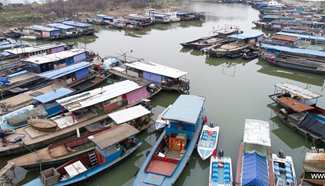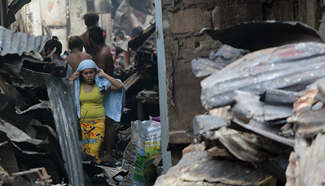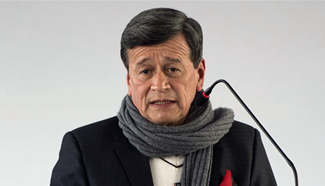RAMALLAH, Feb. 8 (Xinhua) -- Israel's recent legislation legalizing settlement construction on Palestinian lands in the West Bank may be an attempt to undermine the two-state solution, said Palestinian analysts.
The Israeli Knesset, or parliament, passed the controversial law on Monday, retroactively legalizing dozens of Jewish outposts with around 3,850 housing units illegally built on privately owned Palestinian lands, despite international condemnation deeming the law unconstitutional.
Israel offered to compensate landowners with money or alternative land after seizing their lands, even if Palestinians refuse to waive their property.
Mustafa Barghouti, Palestinian National Initiative Party Chairman, told Xinhua that the new Israeli law "paves the road for 120 settler outposts to become settlements which include 3,850 housing units," adding "this dangerous law legalizes confiscation of private lands for settlement construction."
He also warned the law "would allow Israel to seize around 60 percent of the West Bank territory, classified as area C according to the Oslo Accords signed in 1993, hence shattering the concept of establishing an independent Palestinian state."
Israeli law stipulates that outposts are unauthorized and illegal in the West Bank occupied by Israel in the 1967 Mideast War, where Palestinians plan to build their future state.
However, "illegal" outposts and "legal" settlements are both internationally condemned as violations of the norms.
Israeli settlements is the thorniest issue impeding the resumption of bilateral peace negotiations between Israelis and Palestinians, who called on the international community to take immediate action against it.
Recent U.S.-sponsored talks between Israelis and Palestinians ended in vain in April 2014.
Abdulmajeed Sweilem, a Ramallah-based political analyst, told Xinhua that passing this law in Israel's parliament "reveals the fact that settlements mobilize right-wing radical ideology in Israel, which is not only an occupying power, but additionally a political settlements' state."
He explained Israel "is employing its funds and other financial resources toward a government-supported mechanism, with right-wing parties, to keep settlements a major issue for the right wing in Israel who controls the political equation."
Israel's approval of the law comes weeks after the United Nations Security Council (UNSC) adopted resolution 2334, which considers Israeli settlements in occupied Palestinian territories illegal, calling on Israel to halt further construction.
Only a few days before passing the new law, the Israeli government approved the construction of over 6,000 housing units in the West Bank and East Jerusalem settlements.
Samih Shbeib, another West Bank political analyst, linked the increase of Israeli settlements with the U.S.'s new administration of President Trump.
He told Xinhua that America's silence regarding settlements encouraged Israel to increase it substantially.
"Increased settlements, especially in Jerusalem, its suburbs and the West Bank, all indicate that Israel plans to annex the entire West Bank in the future," said Shbeib.
He stressed that the situation "is critical" and needs an international reaction to end Israeli settlement construction, as such measures "threaten regional peace, stability and security."
Palestinian officials recently threatened that if Israel continues increasing its settlement activity in Palestinian territories, then Palestinians plan on presenting their case at the International Criminal Court (ICC) in the Hague, demanding an international investigation of increased settlement construction.
Reyad el-Malki, Palestinian foreign minister, told the "Voice of Palestine" Radio that "if the new U.S. Administration, the UNSC and the ICC all fail to stop Israel's takeover of Palestinian lands, then we cannot subsequently be blamed for taking practical measures against it."
"Palestinians will take their case to the ICC and demand an official court investigation," he said, adding "we will once more request that the UNSC holds an emergency session for another resolution against this Israeli law."
He also stated that Palestinians will take other measures "mainly reconsidering security cooperation with Israel."
Rajab Abu Sereyah, another West Bank Palestinian political analyst, informed Xinhua that the Palestinian dispute over Israeli settlements "has currently reached its peak, particularly under the new U.S. administration of President Trump."
"The decades-long conflict with Israel has reached a crucial stage, challenging Palestinians and preventing them from establishing their independent state with east Jerusalem as its capital," added Abu Sereyah.
Related:
UNITED NATIONS, Feb. 7 (Xinhua) -- UN Secretary-General Antonio Guterres on Tuesday said that he "deeply regrets" that Israel adopted a bill late Monday that would retroactively legalize Jewish settlements on privately owned Palestinian land. Full story
JERUSALEM, Jan. 31 (Xinhua) -- Days after U.S. President Donald Trump was inaugurated, the Israeli government announced its plans to build an additional 2,500 homes for Jewish settlers in the West Bank. Full story










